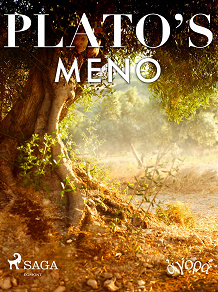E-bok
Plato’s Meno
A dialogue between Socrates and Meno probes the subject of ethics. Can goodness be taught? If it can, then we should be able to find teachers capable of instructing others about what is good and bad, right and wrong, or just and unjust. Socrates and Meno are unable to identify teachers of ethics, and we are left wondering how such knowledge could be acquired. To answer that puzzle, Socrates questions one of Meno’s servants in an attempt to show that we know fundamental ideas by recollecting them.
Plato lived in Athens, Greece. He wrote approximately two-dozen dialogues that explore core topics that are essential to all human beings. Although the historical Socrates was a strong influence on Plato, the character by that name that appears in many of his dialogues is a product of Plato’s fertile imagination. All of Plato’s dialogues are written in a poetic form that his student Aristotle called “Socratic dialogue.” In the twentieth century, the British philosopher and logician Alfred North Whitehead characterized the entire European philosophical tradition as “a series of footnotes to Plato.” Philosophy for Plato was not a set of doctrines but a goal — not the possession of wisdom but the love of wisdom. Agora Publications offers these performances based on the assumption that Plato wrote these works to be performed by actors in order to stimulate additional dialogue among those who listen to them.
Plato lived in Athens, Greece. He wrote approximately two-dozen dialogues that explore core topics that are essential to all human beings. Although the historical Socrates was a strong influence on Plato, the character by that name that appears in many of his dialogues is a product of Plato’s fertile imagination. All of Plato’s dialogues are written in a poetic form that his student Aristotle called “Socratic dialogue.” In the twentieth century, the British philosopher and logician Alfred North Whitehead characterized the entire European philosophical tradition as “a series of footnotes to Plato.” Philosophy for Plato was not a set of doctrines but a goal — not the possession of wisdom but the love of wisdom. Agora Publications offers these performances based on the assumption that Plato wrote these works to be performed by actors in order to stimulate additional dialogue among those who listen to them.
Logga in för att låna
Information
Stöds av följande plattformar
PC/Mac
Surfplatta Läsplatta
Smartphone

